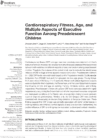Abstract
Cardiorespiratory fitness (CRF) and age have been positively associated with children’s executive function; however, few studies have simultaneously assessed the associations between both variables and different aspects of executive function among preadolescent children. Therefore, the purpose of the current study was to evaluate the simultaneous influence of CRF and age on three aspects of executive function. Preadolescent children’s (n = 338) CRF levels were estimated based on the Progressive Aerobic Cardiovascular Endurance Run (PACER) test and then grouped into two age groups (Young Group: 9–10 years old and Old Group: 11–12 years old). Hierarchical multiple regression analyses were conducted for the 2-back task, the Flanker task, and the Local-Global task to assess the influence of CRF and age on working memory, inhibitory control, and shifting, respectively. Preadolescent children with greater CRF levels were associated with higher response accuracy during the 2-back task and shorter response time across congruent and incongruent conditions of the Flanker task, whereas older children showed generally superior cognitive performance. Notably, only the Old Group’s CRF was positively correlated with the accuracy in the switching condition of the Local-Global task. These findings suggest that CRF or age was generally associated with better performances in working memory and inhibitory control aspects of executive function. Furthermore, the positive influence of CRF on shifting may be modulated by developed cortical maturation.



Responses